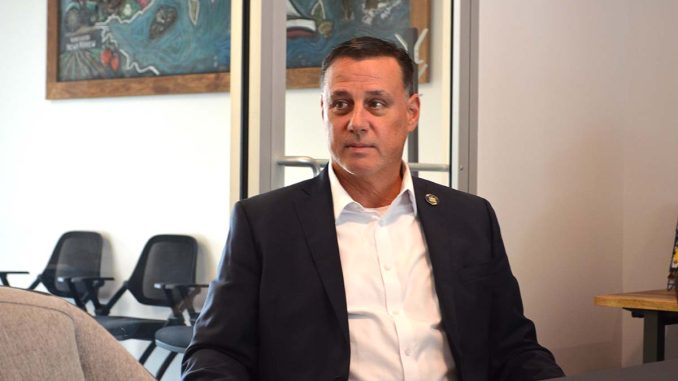
New York’s 1st Senate District encompasses a large swath of Suffolk County, including Riverhead, Southold, Shelter Island, Southampton and East Hampton and stretching into parts of Brookhaven Town. As the upper chamber of the state Legislature, the Senate’s 63 members are primarily responsible for drafting and approving changes to state law; working with Gov. Kathy Hochul and the state Assembly to establish annual budgets, set spending levels and raise and lower taxes; and voting to uphold or override gubernatorial vetoes. The Senate alone has the authority to approve or reject non-elected state officials and judges nominated by the governor. Each senator serves a two-year term and there are no term limits. All 63 seats are up for election this year. The Democratic Party currently controls the majority in both chambers of the Legislature as well as the governor’s office.
Republican incumbent Sen. Anthony Palumbo is seeking his third term in the high chamber. He first won the seat in 2020, replacing his retiring Republican predecessor Kenneth La Valle, New York’s longest-serving state representative. The state Senate candidates met recently with The Suffolk Times’ editorial staff to discuss their motivations for seeking office and outline their key priorities for serving the needs of District 1 voters.
Anthony Palumbo (R-New Suffolk)
Mr. Palumbo is the incumbent state Senator representing District 1. Before his election to that office in 2020, he had served in the state Assembly since 2013. A practicing lawyer, he previously worked as an assistant Suffolk County district attorney before starting a private practice on the North Fork and later joining the Legislature. This is his seventh run for political office. Mr. Palumbo highlighted some of his key legislative achievements, including the first-time home buyer exemption from the Community Preservation Fund, a 2% transfer tax paid by buyers in all five East End towns.
Mr. Palumbo said affordable housing, public safety and protecting the environment are his key priorities for District 1. He stressed the need for improved resiliency measures and the importance of local government control, particularly in matters of housing and community development. He noted his bipartisan efforts on several key issues and the importance of balancing the need for new development with open space preservation. He also stressed the need for stronger laws to combat the fentanyl epidemic, including supporting Chelsea’s Law which allows law enforcement officials to charge drug dealers linked to fatal overdoses with manslaughter.
On affordability and local control: Mr. Palumbo noted his sponsorship in the senate of the Community Housing Fund, an initiative from Assemblyman Fred Thiele to add a .5% fee to all home purchases on the East End to support affordable housing development, which was approved by voter referendum in 2022 in all East End Towns except Riverhead. He also commented on Gov. Hochul’s efforts to mandate the creation of high-density residential development near transportation hubs. “Her proposal did not go over well and never came to be,” Mr. Palumbo said, noting the unified opposition to the proposal from state lawmakers across Long Island. He pointed to the need to “strike a balance” between increasing housing opportunities and protecting open space.
“You can’t preserve all of it,” he said, adding that “when the density is right, the location is right,” individual communities need to make decisions on the best path forward.
On open space and protecting water quality: Mr. Palumbo pointed to the success of the Community Preservation Fund, which he said had so far garnered more than $2.5 billion from area real estate transactions to help East End municipalities preserve open space. He noted his support for recent amendments to that program allowing up to 20% of those funds to be used for water quality improvements and measures to protect local waterways. “We need to make sure we get both of [those programs] funded every year,” he said, noting that CPF has already been extended through at least 2050, “and both of them are alive and well.”
On workforce retention and transportation: Mr. Palumbo spoke of the challenges facing many local businesses — including large employers such as hospitals — to retain talent due to the challenges of finding adequate housing in the area. He highlighted the importance of the LIRR’s South Fork Commuter Connection, which provides added train service from Speonk to Montauk during peak travel times and the need to find ways to expand train service on the North Fork, including electrifying trains east of Port Jefferson and Ronkonkoma. He noted the $800 million set aside in the MTA’s capital plan to increase sidings and add service. “You need to do what’s right for workers. And I guarantee, the more that you promote public transportation the better. It’s good for everybody and it’s better for the environment.”
On fiscal responsibility and bipartisan cooperation: Mr. Palumbo pointed to his record of success in getting bills passed in the Legislature. “I think that the amount of bills I pass is more than most members on both sides of the aisle,” he said, noting the need to work with members of both parties to advance legislation that helps area constituents. “So I think that shows I can get it done when something is a priority.” He added that overspending has historically been a problem, regardless of which party is in the majority. “We have more of a spending problem than a revenue problem,” Mr. Palumbo said. “Our budget is gigantic, larger than Texas and Florida combined, and both states have more people.”

